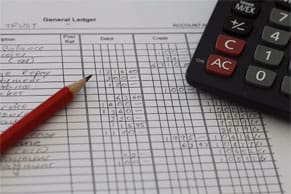When selecting accounting software to run their businesses, companies ultimately have two choices: a cloud-based or desktop system. Though desktop software has traditionally been widely used, companies are increasingly switching to the cloud for multiple reasons. Cloud-based software offers inherent benefits, such as enabling finance teams to manage accounting from anywhere, on any device. In addition, leading cloud accounting software offers more comprehensive and flexible financial management features than desktop accounting software, so companies often start out with desktop software and switch to the cloud as they grow and develop more complex needs.
Cloud vs. Desktop Accounting: What Are the Differences?
Cloud and desktop accounting software products both help businesses handle basic financial processes, such as recording transactions, managing accounts payable and receivable, handling taxes and invoicing. But there are key differences between cloud and desktop accounting software, and those differences have big implications for businesses. They range from remote access capabilities, administration and security to financial reporting, compliance and support for more complex business structures.
What Is Cloud Accounting?
Cloud accounting software is hosted by a software vendor, and companies access the software and their financial data over the internet using a browser. They don't need to buy, install and manage software on their own computers. Instead, they pay to use the software on a subscription basis.
Key advantages of cloud accounting software include the ability to access financial data from anywhere, using any capable device, as well as automatic data backups. Cloud-based systems typically also integrate more easily with other business applications. This provides a real-time view of information across business operations, including the supply chain, inventory and manufacturing, which facilitates faster, more-informed decision-making.
What Is Desktop Accounting?
With desktop accounting software, the accounting software and financial data reside on each person's desktop or laptop computer. Companies typically have to buy a software license up front and pay for periodic new releases. They need to manually install the software and back up the company's data. Finance professionals can only access financial data from the computer on which the software is installed, so they need to have that computer with them in order to access the system from home or while traveling.
Desktop accounting software handles basic accounting functions but lacks capabilities that many growing companies need. It can be difficult to manage version control among large teams, for example. Limited and inflexible reporting means finance professionals often need to manually export data to spreadsheets for analysis. This is slow and error-prone, and it hinders the company's ability to quickly understand and respond to changes in business conditions.
Key Differences
There are many differences that distinguish cloud accounting from desktop accounting. These include accessibility, pricing models, data backups and upgrades, as well as financial management and reporting capabilities. Here are some of the key differences to consider:
| Cloud Accounting Software | Desktop Accounting Software | |
|---|---|---|
| Payment model | Pay-as-you-go monthly subscription based on the number of users and features required. | An up-front license cost, plus an additional cost for upgrades. |
| Installation and updates | No software to install. Businesses are always using the current version of the software. When the supplier updates the software to add features the new version is immediately available to all users. | Businesses must manually install the software and all subsequent upgrades and fixes. |
| Security | Vendors provide enterprise-grade software security and provide access controls. | Companies must protect their data, software and credentials carefully to avoid a breach. |
| Accessibility | Anytime, anywhere access for any user from any device with an internet connection. | Software is installed on specific computers, so employees must take their computers with them in order to access financial data when working remotely. |
| Backup and recovery | Cloud vendor automatically backs up data 24/7. Finance professionals can access the software and financial data even if they lose their computer or it breaks down. | Backups are manual. Users must complete backups regularly to ensure the company doesn’t lose valuable information if their computers break down or are lost or stolen. |
| Sharing data with external parties | Because the data is in the cloud with centralized control over access rights, companies can provide external accountants or other parties with limited or read-only access to relevant data. | Sharing is manual and time-consuming. Users often must manually export data to share with external parties. |
| Automation | Cloud accounting software automates many time-consuming manual processes, including custom reporting and reconciliation. | Little or no automation. |
| Customized reporting | Depending on the software, extensive, customized, real-time reporting may be available to support specific business requirements and accounting regulations. | Limited selection of financial reports, with little customization. It’s often necessary to export data to spreadsheets for custom reporting and analysis. |
| Compliance | Compliance with multiple accounting standards (GAAP and IFRS), government regulations and tax codes. Support for multiple business models with automated revenue recognition. | Support for local requirements and a need to purchase additional modules from the company. |
| Multi-entity and international accounting | Support for multi-entity business structures, including companies with subsidiaries and international operations. | Designed for a single business entity. No support for intercompany accounting or other multi-entity business requirements without purchasing additional functionality. |
| Integration with other applications | Seamless integration with other cloud-based applications, providing a real-time view of data across the business. | Limited ability or difficult to integrate with other applications. Manual data transfer may be necessary. |
Reasons Why Cloud Accounting Software Is Best
There are multiple reasons that companies are choosing cloud accounting over traditional desktop accounting, and those reasons vary depending on each company's priorities. For example, a company with a distributed workforce may choose cloud accounting primarily because of its remote access capabilities. A retailer with warehouse operations in multiple countries may choose cloud accounting to support real-time inventory management operations. In addition, many companies are switching to cloud accounting because they've grown to a point where their requirements outstrip the capabilities of desktop products.
-
Accessibility
Unlike desktop accounting software, authorized employees can access cloud-based software from any location and on any device. This is vital for companies with distributed, remote or mobile workforces, and for companies with a hybrid model in which employees work from home some of the time.
-
Automatic updates
With premier cloud accounting software, upgrades are immediately and automatically available to every user. This ensures businesses always have the latest functionality, including changes to comply with new accounting and tax rules. With desktop accounting, companies often delay upgrading because of the cost and effort required.
-
Less administration
Because there's no need to spend time installing and updating software or backing up data, cloud accounting helps the finance team focus all of their efforts on accounting and financial management, not tedious and time-consuming administration.
-
Integration with other applications
Desktop software typically wasn't designed to integrate with other business applications, so businesses can run into issues when attempting to share data across the business. Leading cloud solutions, however, can integrate via APIs, other apps or be offered as a suite with a broad set of cloud-based business applications that handle almost every aspect of the business, from payroll and HR to warehouse management, providing a more comprehensive, real-time view of the business and helping companies better forecast and track revenue, profit and cash flow.
Beekman 1802, which sells unique skincare products made from goat milk, switched from QuickBooks desktop accounting to a NetSuite cloud-based software suite to handle its rapid business growth. Now the entire organization has access to critical business data, and NetSuite has helped the company move to next-day fulfillment and cut shipping errors. "NetSuite has given us full visibility into the supply chain," says Tomei Thomas, CEO at Beekman 1802. "We know when we're going to be out of stock, and we have mechanisms to reach out to suppliers and expedite things."
-
Automation results in greater accuracy with fewer errors
Cloud accounting software automates many processes, including reporting, data entry and reconciliation. With desktop software, employees must perform more of these steps manually, including entering and exporting data. Manual processes are inherently more prone to human error, in addition to being less efficient. By automating these time-consuming processes, companies can spend more time focusing on managing business growth. As specialist wine kegging and logistics company Free Flow Wines puts it, "We can focus on what we do best in kegging premium wine rather than manual work with orders, inventory and accounting."
-
Customer support
Cloud vendors rely on customers continuing to subscribe to their services, which means they are highly motivated to keep customers happy. Leading suppliers have a reputation for good support, and the fact that they run the software centrally can help them solve technical issues. Some cloud suppliers have customer success teams dedicated to helping businesses make the most of their software.
-
Better security
Cloud vendors have deep in-house cybersecurity resources and much more extensive security expertise than most businesses. As a result, they are better positioned to secure information against hacking or other unauthorized access. Leading cloud software encrypts business data and provides role-based access controls that ensure each user only accesses accounting data they are allowed to see. The company's financial data is stored in the cloud, so if a laptop is lost or stolen, thieves can't gain access to the data unless they have the employee's login information. In contrast, desktop software often has more limited security controls, and if a laptop is stolen, thieves can potentially gain access to company data stored on the system.
-
Reliable backups
Entrusting backups to individual employees is a risky strategy, especially for vital financial data. Cloud accounting vendors automatically maintain backups of companies' data on their secure servers, providing businesses with peace of mind that their critical information is safe.
-
Collaboration
Cloud accounting software makes collaboration easier because everyone has real-time access to a single version of the data. That eliminates the need to manage multiple versions of the same file or copy data onto USB drives for sharing. Distributed teams can more easily work together on projects, accelerate financial processes and share data with external parties.
-
Flexible reporting
Limited, inflexible reporting options in desktop software mean that many companies have to export data into spreadsheets to produce custom reports and analysis — a labor-intensive and error-prone process. Cloud accounting software offers customizable, real-time reporting, helping companies quickly analyze data in new ways that reflect their changing business needs. This helps growing companies rapidly adapt and respond to fast-moving markets.
-
Multi-entity and international accounting
Desktop accounting software is designed to handle accounting for a single business entity. Leading cloud accounting software handles more complex multi-entity, multi-currency businesses, so many companies switch from desktop to cloud accounting when they expand internationally or acquire other companies.
-
Compliance
Comprehensive cloud accounting software helps companies comply with complex regulatory requirements and accounting standards, including the recently published ASC 606 revenue recognition standard. Leading cloud software can automatically generate financial reports to help comply with both the GAAP accounting standards used in the United States and IFRS standards used in other countries. When the cloud software supplier adds support for new standards, regulations or taxation requirements, the features are available to businesses as part of their subscription.
Join the Cloud With NetSuite's Modern Accounting Software
NetSuite cloud accounting software delivers comprehensive financial management capabilities for growing companies, combined with all of the advantages of the cloud. Because data is centrally stored in the cloud, employees can work from anywhere, anytime. Flexible reporting capabilities and dashboards automatically provide real-time insights into critical financial metrics, eliminating complex and error-prone manual reporting processes. Financial teams can save many hours each month by automating other repetitive tasks, such as creating journal entries or reconciling account statements.
NetSuite supports multi-entity and international businesses, helping companies comply with multiple accounting standards, government regulations and tax codes. Because it's part of an integrated ERP application suite covering HR, inventory management, customer relationship management, ecommerce and more, NetSuite accounting software provides a comprehensive, real-time view across the entire business, helping companies make proactive decisions that drive business growth. In the words of Mike Sadler, VP of operations at fast-growing America's Preferred Home Warranty: "NetSuite will not only help our business grow, but also help us to innovate as well, to enhance the customer experience."
Conclusion
Companies are switching from desktop to cloud accounting for many reasons, including the global transition to remote and hybrid working. In addition to inherent cloud benefits, such as real-time access to information, leading cloud accounting software offers more comprehensive features and greater flexibility than desktop accounting, so it can better support the increasingly complex needs of growing businesses.
Cloud vs Desktop Accounting FAQs
Will cloud computing replace PCs?
Cloud computing has become increasingly popular for many reasons, including the fact that it makes it easier for companies to support a dispersed workforce. Employees can access cloud-based applications from any capable device, including tablets or phones as well as PCs. However, that doesn't mean that PCs will be entirely replaced because people may continue to use PCs to run their remaining desktop applications.
What is a cloud desktop?
A cloud desktop is a cloud computing solution that allows users to access their desktop environment, files and applications from anywhere via the cloud.
What is the difference between installed and cloud software?
Installed software is stored on a computer's hard drive and is loaded into the computer's memory at run time. The company typically has to pay up front for a license to use the software, and upgrades must be manually installed on the computer. In contrast, cloud software runs on servers in the cloud, and users access the software over the internet using a web browser. Software upgrades occur in the cloud and automatically become immediately available to every user.
Is cloud-based software safe?
Major cloud vendors have a considerable heritage in security. Vendors typically have much more expertise in cybersecurity than do most businesses. They apply their security resources and expertise to their cloud solutions, making them particularly secure.
How does cloud-based computing differ from desktop systems?
Desktop systems are installed on a company's hardware. Some systems may require IT expertise to install and manage. Cloud-based software runs on a supplier's servers in the cloud, and business users access it over the internet.
What is a desktop accounting system?
A desktop accounting system is installed directly on a person's computer. The company's accounting data resides on that computer. The accounting application and data may only be accessible from that computer.
What is a cloud-based computerized accounting system?
A cloud-based accounting system is hosted on an external vendor's cloud servers. A company's financial specialists and other authorized employees access the system over the internet. This means approved employees can access the system from any location with internet access.
What are three key features unique to a desktop computerized accounting system?
Key features of a desktop accounting system include: The accounting software is installed on your PC, the software can only be accessed from that PC, and business users are responsible for manually backing up and upgrading the software.









